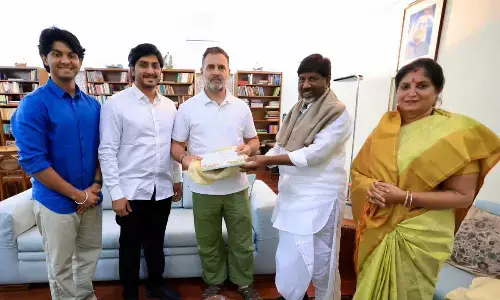Women's empowerment in UP bleak

Women\'s Empowerment in UP Bleak. Gender equity and the status of women remain the hand-maiden of callous politics in India\'s largest state by population and 2014 has been deplorably stark.
.jpg) Gender equity and the status of women remain the hand-maiden of callous politics in India's largest state by population and 2014 has been deplorably stark. The 'Bahu lao, Beti Bachao' campaign in Uttar Pradesh is the latest feather in the BJP's cap of regressive and communal politics.
Gender equity and the status of women remain the hand-maiden of callous politics in India's largest state by population and 2014 has been deplorably stark. The 'Bahu lao, Beti Bachao' campaign in Uttar Pradesh is the latest feather in the BJP's cap of regressive and communal politics.
Whether it is the felling of the Babri Masjid and the Ramjanmabhoomi movement or the rise of the first woman Dalit chief minister of India, the trajectory of political discourse and related mobilization in Uttar Pradesh is marked by (re)politicising and stoking voter sentiment around the twin issues of caste and religion, most recently witnessed in the spectre of the religious conversions in Agra, the Muzaffarnagar riots and in the political gimmick of the alleged love jihad.
The dominant political debates in the Hindi heartland state have circulated around the twin issues of caste and religion in electoral and administrative politics to the neglect of other pertinent ones. For a state with the highest number of seats in parliament and the largest state legislature in the country, such issues have more than often gained national leverage of their own traction.
There is, however, another language that seems to be doing the rounds. Apart from the alleged trope of secular development, political speak on women's empowerment has come aboard as the new token item in the agendas of political parties.
For a state that ranks abysmally low on most mainstream indicators - the child sex ratio has dipped to 899 in 2011 from 916 in 2000, female literacy stands at 59 percent putting UP among the bottom five states and only eight percent of the state legislature is made up of women - the recent debacle at the Aligarh Muslim University only compelled us to take stock of the position of women in institutes of higher education as well. Hence a reorientation in the political agenda with regard to women should perhaps be seen as a welcome change.
Unfortunately, the script of such apparent reorientation ironically reeks of the kind of regressive agendas that one is all too familiar with. Speaking at a recent national convention of the Samajwadi Party's women's wing, Mulayam Singh Yadav (MSY) said that "those who encourage purdah should be sent to jail".
For a party that has long opposed the women's reservation bill in parliament with a supremo like MSY, who said that women's reservation would only allow the kind of women who "attracted catcalls and whistles" into parliament and discourage rural women for they are "unattractive", it displays yet another instance of insensitivity and irresponsibility.
It is no surprise that Yadav senior rolled out the "boys will be boys, they make mistakes" in opposition to the anti-rape laws formulated in the wake of the December 16, 2012, gang rape in Delhi nor is the fact that his son Akhilesh Yadav, the chief minister, asked a media representative as to why she was worried about rapes in the state if she had not "faced any danger".
The list can go on, but here's the last one on it - the Samajwadi Party is also one of the few that vociferously opposed the stringent provisions in the anti-rape bill in parliament while the party supremo's brother and Rajya Sabha MP, Ramgopal Yadav, opined that the bill was drafted by "mentally retarded" people. So much for holding a national convention on the empowerment of women in the state after a gap of many years, spurred by the politics of patronage and tokenism.
But the real danger that lies ahead is not just due to the contorted gender politics of the incumbent Samajwadi Party government; the future does not hold any promise either.
Given the considerable number of seats won by the Bharatiya Janta Party in the Lok Sabha elections and the so-called "Modi-wave" in the light of the upcoming assembly elections in 2017, the politicization of gender shall no longer be devoid of extreme communalization. Even though the hot air of the love jihad campaign may have fizzled out electorally during the recent state by-elections, its legacy of tension and polarization cannot be ignored.
For a state that has often made headlines for violence against women, not without dimensions of caste and religion - the rape of two teenage Dalit girls in Badayun in April 2014, the gang rape of a young girl in Fatehpur in 2011 - only a couple of incidents that came to attention due to the party politics of patronage over the victims, even a semblance of the acknowledgement of this intersection is far from available.
Therefore, stuck between the regressive agenda of the Samajwadi Party that continues its legacy of electoral appeasement with a near feudal outlook towards the rights and positions of women on the one hand and the frictional politics of communalizing sentiments of honour and partisanship over gender as does the Bharatiya Janta Party, women in the state do not have reason enough to be either assured or hopeful.
This is not to exonerate either the Bahujan Samaj Party or the Congress, which in their respective tenures have not taken up the pressing issues. According to Roop Rekha Verma of Saajhi Duniya, an organization that has worked relentlessly towards restoring communal harmony and women's right in Lucknow, "the more dominant and influential parties' attitudes on this issue have ranged between being regressive and being negligent. These parties say and do everything only with an eye on vote-bank and issues of human rights hardly matter to them".
In the biggest state of the world's largest democracy, which would be the world's fifth most populous country if it were an independent political entity, the fate of the agenda for women's empowerment hangs between the devil and deep blue sea - and that is certainly nothing to be proud about as 2015 dawns upon us.
By Bhoomika Joshi and Sanober Umar
( Bhoomika Joshi is a Program Associate on the Indian Council of Social Science Research sponsored research project on gender and social ecology in Uttarakhand. Sanober Umar is a PhD student at the Department of History, Queen's University, Canada. The views expressed are personal. They can be contacted [email protected])








